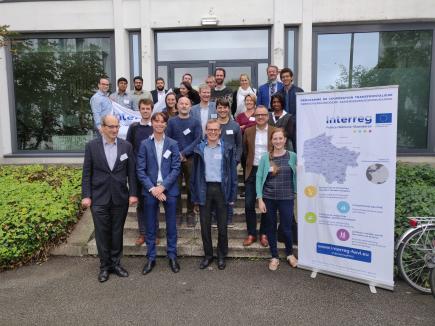Kick-off of the PSYCHE project

(28-11-2019)
PSYCHE: Gasification of plastic waste followed by Fischer-Tropsch synthesis
On September 25th 2019, the PSYCHE kick-off meeting with the advisory board took place at Ghent University. The PSYCHE partners are happy to welcom the following companies in the advisory board: AVGI, Comet Traitements, Dow, Engie, Ematco, Galloo, Indaver, Ostend Basic Chemicals, Recticel, Suez, Total Feluy, Unilin and Vanheede. The PSYCHE project started on July 1st 2018 and now that the project has started its second year, the interaction with the advisory board has been initiated. The PSYCHE advisory board will assemble every six months and next to the company members, also the the PSYCHE associated partners (Catalisti, Greenwin and Matikem) will be invited. These clusters will assist in dissemination of the project results to the companies present in the program region. In this way, the PSYCHE project contributes to the securement of the strategic position of the present industrial tissue on plastics in Europe and its transformation to a circular industry.
The PSYCHE project on the conversion of plastic waste to base chemicals via gasification and subsequent Fischer-Tropsch synthesis has received European funding via the Interreg France-Wallonie-Vlaanderen program (total budget 2.6 million euro). The project is a collaboration between Ghent University, Université Catholique de Louvain (UCL), Ecole National Supérieure de Chimie de Lille(ENSCL)-Centre Nationale de la Recherche (CNRS) and CERTECH. The coordination of the project will be performed by Ghent University. Co-funding is provided by the province of East-Flanders, the province of West-Flanders, the Walloon Region and by the Direction Générale Opérationelle de l’Economie, de l’Emploi et de la Recherche (DGO 6, Walloon Region).
The PSYCHE project focusses on the production of base chemicals out of plastic waste for application in the chemical industry. Expectations are that the production of plastics (currently amounting to 8 million tons of PE, PP, PS and PVC in Europe) will be a fourfold higher by 2050 than today, resulting in a considerable environmental impact and economic loss if these plastic waste streams are handled according to the current recycling strategies. These current strategies mostly consist of landfilling and incineration of the plastic waste. Since mechanical recycling is not feasible for certain streams of plastic waste, thermochemical recycling towards the original chemical building blocks is an interesting alternative. Within the project, the gasification of several plastic waste streams will be demonstrated by using an innovative technology. The obtained gas will then be catalytically transformed into base chemicals such as linear alpha-olefins.
Contact
Elisabeth Delbeke
T +32 9 331 17 51
Elisabeth.Delbeke@UGent.be